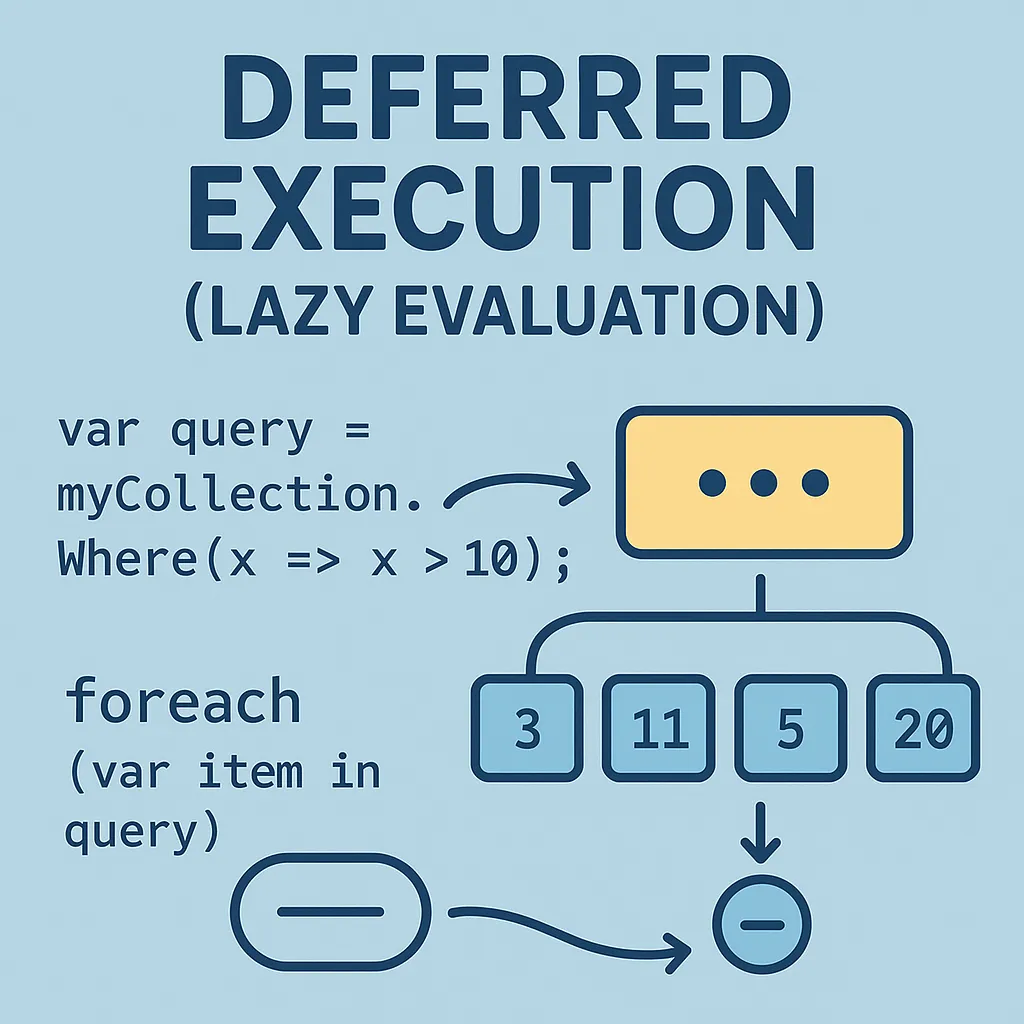Understanding LINQ Deferred Execution: Why Your Queries Don't Run When You Think They Do
Published: 2025-08-19
Understanding LINQ Deferred Execution: Why Your Queries Don't Run When You Think They Do
If you've been working with LINQ in C#, you might have encountered some surprising behavior where your queries seem to execute multiple times or don't behave as expected. The culprit is often deferred execution – one of LINQ's most powerful yet misunderstood features. Let's dive into what it means and why it's crucial for writing efficient code.
What Is Deferred Execution?
Deferred execution, also known as lazy evaluation, means that LINQ queries are not executed immediately when you write them. Instead, the query is only defined, and the actual execution is postponed until you actually need the data.
Here's a simple example that illustrates this concept:
var myCollection = new List<int> { 5, 15, 25, 8, 12 };
var query = myCollection.Where(x => x > 10);
At this point, nothing has been filtered yet. The variable query doesn't contain the filtered results – it contains a description of what should be done when the data is eventually needed.
When Does Execution Actually Happen?
The query executes only when you try to access the data. This happens when you:
Use foreach to iterate:
foreach(var item in query)
{
Console.WriteLine(item); // Execution happens here
}
Materialize the query with ToList(), ToArray(), etc.:
var list = query.ToList(); // Execution happens here
Use aggregation methods:
var count = query.Count(); // Execution happens here
var first = query.First(); // Execution happens here
The Critical Gotcha: Multiple Executions
Here's where deferred execution can bite you: every time you iterate over the query, it executes again from scratch.
var expensiveQuery = database.Users
.Where(u => u.IsActive)
.Select(u => PerformComplexCalculation(u));
// First iteration - query executes, database hit
foreach(var result in expensiveQuery)
{
Console.WriteLine(result);
}
// Second iteration - query executes AGAIN, another database hit!
var count = expensiveQuery.Count();
If this is a LINQ-to-SQL or Entity Framework query, you've just made two separate database calls when you probably intended to make just one.
When and How to Materialize Queries
To avoid multiple executions, you can materialize the query by forcing it to execute once and storing the results in memory:
// Execute the query once and store results
var materializedResults = expensiveQuery.ToList();
// Now you can iterate multiple times without re-executing
foreach(var result in materializedResults)
{
Console.WriteLine(result);
}
var count = materializedResults.Count; // No database hit - uses cached results
Performance Considerations
When to Use Deferred Execution:
- When you're only going to iterate once
- When you want to chain multiple LINQ operations efficiently
- When working with infinite sequences or large datasets where you might not need all results
When to Materialize:
- When you need to iterate multiple times
- When the underlying data source is expensive to query (databases, web APIs)
- When you want to ensure data consistency across multiple operations
- When debugging complex queries (materialized results are easier to inspect)
Best Practices
- Be intentional about when your queries execute
- Profile your applications to identify unexpected multiple executions
- Use ToList() or ToArray() when you know you'll need the data multiple times
- Consider the trade-off between memory usage (materialized) and computation/IO cost (deferred)
Conclusion
Deferred execution is a powerful feature that makes LINQ flexible and efficient, but it requires understanding to use effectively. By being aware of when your queries actually execute, you can write more performant code and avoid common pitfalls like unintended multiple database hits.
The key takeaway: LINQ queries are lazy by default, which is usually what you want, but don't forget to materialize them when you need to use the results more than once!
